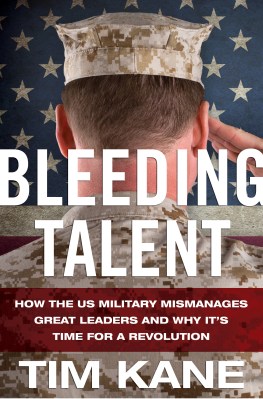U.S. soldiers in Afghanistan.
Military personnel policy is equal parts art and science. If it were all science, the Pentagon and its military services would have figured out long ago how to get the most out of each man and woman in uniform, give them rewarding careers, and win wars to boot.
The fact that the U.S. military’s personnel engine isn’t firing on all cylinders is the topic of Tim Kane’s new book, Bleeding Talent: How the U.S. Military Mismanages Great Leaders and Why It’s Time for a Revolution. The one-time Air Force officer will elaborate on the topic at the Hudson Institute on Jan. 31, where he serves as chief economist (wow: two dismal sciences in a single scholar!). Battleland conducted this email chat with Kane last week.
What is the key point you’re trying to make in Bleeding Talent: How the U.S. Military Mismanages Great Leaders and Why It’s Time for a Revolution?
The personnel bureaucracy in the Pentagon is destroying the human capital invested in its troops, bleeding good people out into the civilian world but bleeding even more talent internally through mismanagement.
I learned while researching the book that presidents as far back as Harry Truman and Dwight Eisenhower tried to get the problem fixed. Only thanks to the constant patriotism of fresh generations of Americans is the Pentagon able to cover up the talent mismanagement. Recognizing that the U.S. military went through one successful radical transformation – adopting the All Volunteer Force in 1973 and ending the draft – I am calling for the next logical step.
A Total Volunteer Force will institute volunteerism during the entire career of our soldiers, not just on the first day. Currently, the military has one foot in the coercive past and one foot in the professional future, and it’s time to go all the way towards respecting and trusting the men and women who serve.
Speaking of revolution, as your subtitle does, what three changes would you make, if you could order them to happen to the military personnel system?
Number one, commanders at all levels would have hiring authority, which means that a wing commander in the Air Force or brigade commander in the Army would select their own unit commanders, executive officers, and so on.
On the flip side, officers would be free to apply to any open position and would be free to take any job offered so long as they met the qualifications. The whole inefficient mess of centrally-planning the job-assignments process would be eliminated, but HR officers would be more important than ever as mentors and advisers to local units.
The second priority would be to institute a more honest system of performance evaluations.
The current system lacks moral courage and really erodes the integrity of the people on both sides of evals. A better system would use forced rankings across multiple categories, meaning that only 10-20% of officers in a unit would be deemed top performers overall, and 10-20% would be ranked the weakest overall.
However, given multiple categories, many officers would might be ranked “top” in technical proficiency, leadership, or integrity. A separate evaluation from peers and subordinates would also be part of the performance record. This would help identify the best leaders as distinct from the best warriors, and the military should allow officers to do what they do best.
The third priority is lateral entry.
Allowing former officers to exit and re-enter and re-exit and re-enter, and to serve as long a career as they want without career-tenure constraints is essential to bringing fresh thinking into the U.S. military. Why in the world are we gearing up for cyber warfare and simultaneously barring veterans now working for Symantec, Cisco, or Google to rejoin the ranks? That is folly.
By most accounts, we have the best military in the history of the world. Why risk tinkering with success?
Our military is the best, and that is almost entirely because of what the military does right: recruiting, training, and educating the best leaders and soldiers in the world.
But the Army has gotten this good by constantly innovating – new weapons systems, new operational structures, new branches (Air Force!). What the Army hasn’t done is to fundamentally innovate its HR system since 1973. In fact, the bureaucracy has gotten worse. Evals are inflated. Force shaping is a disaster. Career planning is impossible as the technology battlespace evolves.
My survey and others identify a rise of toxic leaders as a result, and 55% of active-duty officers want the system to be radically reformed.
You say that military leaders are naturally “entrepreneurial” and that the Total Volunteer Force would capitalize on that by allowing much faster promotions for the best and brightest. Do you risk creating a generation of George Custers without the necessary experience before command?
Look, the U.S. has had something like 10 top commanders of our forces in Afghanistan over 10 years because the incentives today generate ticket-punching, not experience.
Mid-level officers rotate in and out of jobs so fast that they are not operationally optimized, and that merry-go-round costs lives. The military-promotion system now is on the far end of the spectrum biased toward seniority and away from merit. That’s a problem. It rules out the George Custers, true, but also the Jack Gavins and Elmo Zumwalts.
The bottom line is that the U.S. military aims for senior officer mediocrity.
The alternative is to let commanders hire and promote the best men and women possible. That may mean a few 30 year-old colonels. It also means a lot off 40-year old captains who are natural pilots and warriors, but neither interested or talented at being high-ranked staffers.
In my ideal Navy, Maverick would still be flying his Tomcat. Today, he’s either working on a spreadsheet or PowerPoint in the Pentagon basement, or he’s flying a 747 out of Hong Kong as a civilian pilot for United Airlines.
Are the problems you cite on the “software” side of the military – people – better, worse, or the same on the hardware, weapons-buying side?
Worse by half on the people side.
Buying hardware is relatively easy, because the economic forces of supply and demand are simpler. You can centrally plan hardware, but not people because human capital is not made up of interchangeable parts.
Yet the whole system of year groups and specialty codes is only in place to make the slating process manageable, as if it were an inventory problem.
When Secretary of War Elihu Root ran the U.S. military at the start of the last century, the Army and Navy could treat muscle as just another part of inventory. That era ended long ago, but those management rules still dominate how talent gets treated until about the O-6 level.
Labor supply from a talent perspective is recognized as much more diverse, and a couple centuries of capitalism prove that the efficient sorting of supply and demand will emerge from markets in a way that can never be achieved by central planning.
Isn’t some of the inefficiency built into the U.S. military services and their personnel shops just part of the “white noise” of democracy?
Not at all!
Just think about the great leaders in American history who would never make rank in our system. George Washington took a 16-year hiatus as an entrepreneur between his four years as a major to his appointment as commander in chief. That’s lateral entry: now illegal.
Dwight Eisenhower was a staff officer and Robert E. Lee was an engineer, both way off the operational golden path necessary to make general today. More to the point, Ike would have been rotated out of his role as Supreme Allied Commander in Europe in 1943 to give someone else a turn.
Democracy is a values-based political system with liberty at its core, but our military has evolved to be less respectful of individual autonomy.
The “needs of the [service]” is used to justify bad job matching. And for those who want to believe that service values are in conflict with market values, take off the rose-colored glasses. Massive retention bonuses and a 20-year cliff retirement scheme are used to coerce senior officers instead of the simple alternative of giving officers control of their own career choices with a 401K savings package.
Why the distrust of free markets by general officers? I don’t know, but I suspect it is because they have literally not known anything different. They trust the market for police officers to protect American streets (which are dangerous) but not the market for platoon commanders in Korea?
Would the imposition of a draft, or some kind of national service, make the changes you believe are needed more or less likely to happen?
A draft would be a step backward from the professional Army toward a so-called citizen Army, involving more coercion and even worse retention and morale.
In fact, one of the chapters of Bleeding Talent is about the “myth of the stupid soldier,” which is a hangover stereotype from the 60s generation. Some research I did years ago proved that our enlistees are both smarter, and from wealthier neighborhoods, than their civilians peers. We can thank the volunteer professional service values for that, which would be ruined by a renewed draft. Over 90% of active duty troops prefer the AVF over a draft. I suspect 90% will also favor the Total Volunteer Force over the AVF — even the generals and admirals.
Is one military service better at personnel management than the others? Worse? Are the problems service-specific, or Pentagon-wide?
I served in the Air Force myself, which has its own distinct challenges due to the advent of unmanned aircraft which is shaking up what some call the caste system of rated and unrated officers.
But basically, the problems are Pentagon-wide simply because personnel policies were standardized by the Defense Officer Personnel Management Act (a 1980 law that governs the up-or-out promotion process) and previous defense secretaries. I understand that some services, notably the Marines, are better in some areas such as evaluations, but there really is no service that has tried to break free of what former defense secretary Robert Gates called the “institutional concrete” that is bleeding our military talent.
You’re a graduate of the U.S. Air Force Academy. Why should anyone from West Point or Annapolis listen to you?
I focused my research and writing on the Army specifically because I am not from the Army, though I have some credibility as a fellow officer.
If my research focused on the Air Force, it would be instantly categorized as sour grapes. The same constraints bind my friends who wore Army greens. They couldn’t write this, certainly not if they were on active duty.
But I also picked the Army because I have more faith that it can lead this revolution in a way that the Navy and Air Force can’t. Those branches get personnel issues intertwined with their weapons systems. Maybe the Marines could be the catalyst, or the Coast Guard, but I suspect the big three would see reforms there as idiosyncratic.
The real people the Army should be listening to are not policy wonks at think tanks like me, but their own officers.
Internal Army surveys say that 20% of Army commanders are “toxic leaders.” External surveys – I conducted one of 250 West Point graduates – paint a crystal-clear picture of the personnel reforms that would work. The problem is not who is talking, because reformers have been talking for 75 years, but who is listening.
The good news is this current generation of senior Army leaders is hungry for change, and impatient with bureaucratic nonsense. They are hardened by war, and that’s exactly the kind of officer corps that pushed for the AVF in 1973 at the end of our fighting in Vietnam. That suggests 2013 is going to be a great year for reform.




